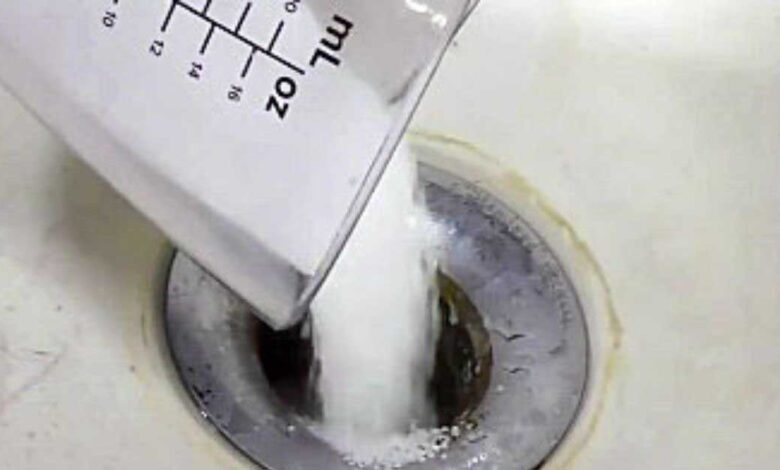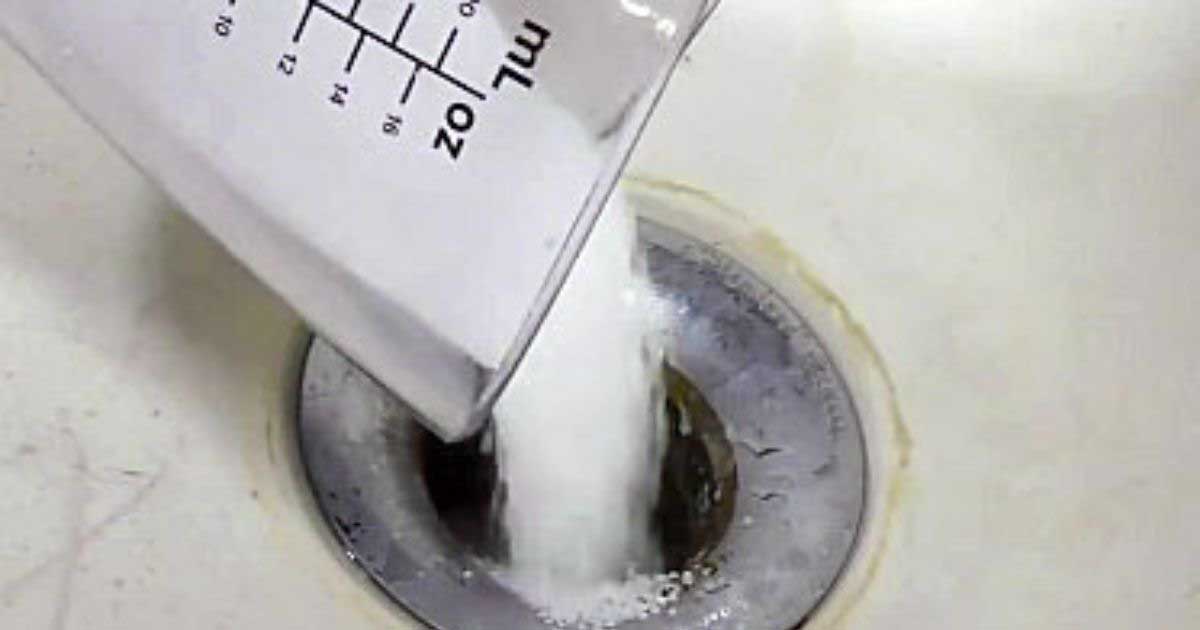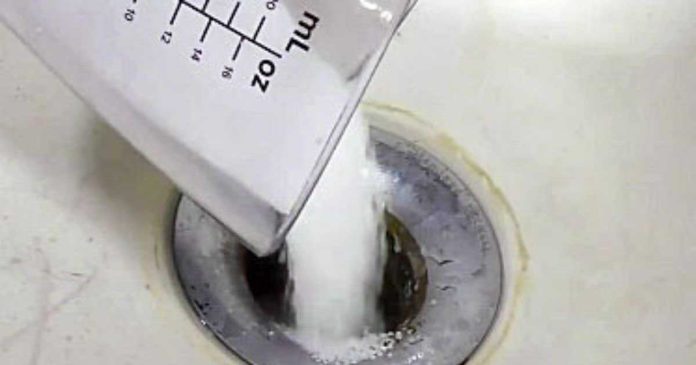5 Effective Ways To Unclog A Drain Without Using Harsh Chemicals


A clogged drain is an extremely common problem that you want to solve quickly and effectively. You can find many drain cleaners on the market that are quite powerful, but their effectiveness usually comes at a cost: they contain harsh chemicals that are potentially harmful to the environment and your family as well.
What if you want to unclog a drain naturally, in an environmentally friendly way? The good news is that you don’t have to give up being green if you want to clean your drain: there are very effective homemade drain openers that will do a great job if applied correctly.
Note that while it is true that there are many methods, only a few of them give acceptable results. I know this because I have tried most of them. In this article, I will share with you the most effective natural methods to get your drain working again.
Let’s dive in:
Powerful Natural Homemade Drain Cleaners
First of all, let’s be clear: kitchen sink clogs and bathroom sink (and bathtub drain) clogs contain different substances. While most kitchen sink clogs are caused by food particles and grease, bathroom sink clogs are usually caused by hair, dirt and soap scum.
Most of the following homemade cleaners are effective against both types of clogs.
Important: Do NOT pour boiling water down a drain if the pipes are PVC, Pex or CPVC, Also be careful if you have a porcelain sink: do not pour boiling water (or very hot water) directly down it as this can cause a crack.
- Baking soda and vinegar
This is probably the most popular home remedy for unclogging a drain naturally (and cheaply). In most cases, it can work wonders, however, it’s important to apply it correctly, otherwise you won’t get far with it.
How does it work?
Chemically, baking soda (sodium bicarbonate) is a base while vinegar is an acid. When you mix these two substances, carbon dioxide is formed and you get an explosive reaction.
We take advantage of this phenomenon when we use baking soda and vinegar to clean a drain: the clog will fall out in smaller pieces under the pressure created by the chemical reaction (or at least it will come loose).
All that’s left is to flush your drain with hot water to remove the small clog particles from your drain system. In general, you’ll get the best results if the ratio of baking soda to vinegar is one to two.
What you need:1 cup baking soda
2 cups of vinegar
1 jar of hot water
Instructions:
First, pour a pot of hot water down the drain: it will melt the fatty part of the clog, which will increase the effectiveness of the carbon dioxide.
Pour a cup of baking soda into the clogged pipe.
Add two cups of vinegar and cover the pipe with a plug so that the explosive reaction will travel deep into the drain and the carbon dioxide cannot escape through the opening in the pipe (this way, the pressure is much more likely to push the plug out of the pipe).
Let the mixture sit for about 10 to 15 minutes.
Rinse the pipe with hot water.
Pro tip: If you think the clog is far from the opening, add two cups of hot water to the vinegar before pouring it down the drain.
- Dishwashing detergent and hot water
This homemade cleaner is very effective against clogs that contain mainly grease or oily substances. So you can expect the best results if you use it on kitchen sinks. However, dishwashing detergent and hot water will not help you if you have to deal with a clogged drain with hair.
How does it work?Hot water melts the grease in the pipe, and dishwashing detergent helps the process by dissolving the grease molecules in the water. In this way, you can remove a considerable amount of grease from the drain system that blocks the flow of water and shrinks the diameter of the pipe.
What you will need:3 tablespoons of liquid dishwashing detergent (preferably natural).
1 pot of hot (almost boiling) water.
Instructions:Pour three tablespoons of liquid dish detergent into a pot of hot water and stir the mixture.
Slowly pour it down the drain and rinse with hot tap water.
If the clog is still there, repeat the process, but this time pour the dishwashing detergent down the drain first and let it sit for 20 to 30 minutes. Then flush the drain with almost boiling water.
3. Salt and Baking Soda

This combination is one of my favorite natural uncloggers. It has helped me and many friends clean a clogged kitchen sink or bathroom drain. This DIY method is not only effective against clogs but also works great against bad drain odors. Salt and baking soda are two natural ingredients that can often work wonders.
How does it work?The combination of baking soda and salt loosens and softens the clog, which you can destroy by flushing the drain with hot water.What you need:1/2 cup of salt
1 cup baking soda
1 jar of hot water
Instructions:Mix the salt and baking soda in a bowl.
Pour the mixture into the clogged pipe (be sure to remove standing water first) and let it sit for at least two hours. If you think the blockage is severe, you can double the dose and leave the mixture in the pipe longer before flushing.
Rinse with hot water. If the clog is still there or the result is not satisfactory, I recommend trying the combination of baking soda and vinegar and letting the chemical reaction move the sludge.
- Vinegar and salt
Here is another powerful combination: acidic vinegar works very well with salt. The synergistic effect between them will remove most types of blockages in a drainage system.
Both ingredients have antibacterial properties, so you can kill two birds with one stone: the mixture will not only help you get rid of the clog, but it will also neutralize bad odors.How does it work?The mixture of salt and vinegar loosens the accumulated debris and breaks it down into small pieces, while the hot water washes away the remains of the clog.What you will need1 cup of salt
2 cups of vinegar
1 pot of nearly boiling water
Instructions:Mix the salt and vinegar in a bowl.
Pour the mixture down the clogged drain and let it sit for 25 to 30 minutes.
Flush the drain with almost boiling water. Repeat the process if necessary.
- Cream of Tartar, Salt and Baking Soda
Slow draining sinks can be easily cleaned using these natural ingredients. You can also use this recipe to prevent clogs: apply the mixture once every two weeks and your drains will stay free of grime and bad odors.
How does it work?
Cream of tartar is a by-product of wine making and, in addition to being a common ingredient in baking, it also has powerful cleaning properties. Used in combination with salt and baking soda, it can loosen and remove buildup and odors in drains.What you’ll need:1/8 cup cream of tartar
1/4 cup salt
1/4 cup baking soda
15 fl oz. of nearly boiling water
Instructions:Thoroughly mix the baking soda, salt and cream of tartar in a plastic container. Shake well.
Pour the mixture down the drain.
Rinse with 15 oz. of nearly boiling water and let stand for 15 minutes. If the water still doesn’t drain freely, try the baking soda and vinegar combination.
